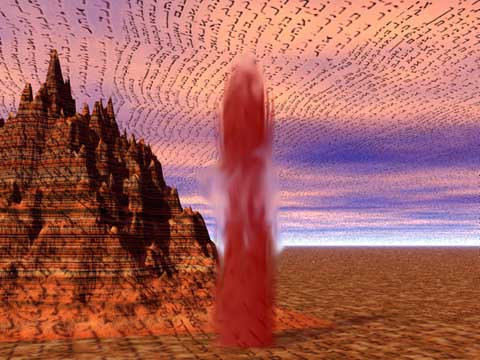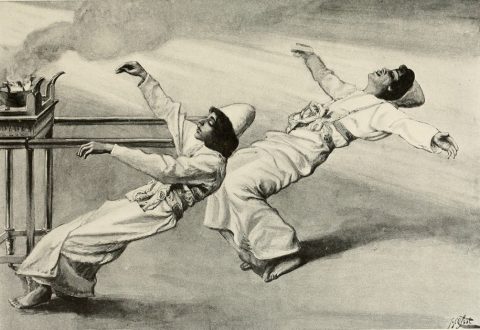Bamidbar – Num. 1:1-4:20

As the Torah Turns
Rabbi Lader’s Weekly D’var Torah
Bamidbar – Num. 1:1-4:20
Our Torah portion this week  opens the book of Bamidbar – In the Wilderness… Num. 1:1-4:20. Our portion opens with a census of the Israelites, and that is why this book is known in English as Numbers. What is the significance of this act of counting? And why here at the beginning of the book? Besides which, there have already been two previous censuses of the people and this is the third within the space of a single year. Surely one would have been sufficient. And what does counting have to do with leadership? The place to begin, is to note what appears to be a contradiction. On the one hand Rashi says that the acts of counting in the Torah are gestures of love on the part of God… In contradiction to this, centuries later King David counted the people, but there was Divine anger and 70,000 people died. How can this be, if counting is an expression of love? With the opening instructions of of our Torah portion, Rabbi Jonathan Sacks points out that a possible answer to this apparent contradiction lies in the phrase the Torah uses to describe the act of counting: se’u et rosh, literally, “lift the head.” This is a strange, expression. Biblical Hebrew contains many verbs meaning “to count”: limnot, lifkod, lispor, lachshov. Why does the Torah not use these simple words, choosing instead the unusual expression, “lift the heads” of the people? The short answer is this: In any census, count or roll-call there is a tendency to focus on the total: the crowd, the multitude, the mass. Here is a nation of 60 million people, or a company with 100,000 employees or a sports crowd of 60,000. Any total tends to value the group or nation as a whole. The larger the total, the stronger is the army, the more popular the team, and the more successful the company. Counting devalues the individual, and tends to make him or her replaceable. If one soldier dies in battle, another will take his place. If one person leaves the organization, someone else can be hired to do his or her job. Rabbi Sacks points to a remarkable feature of Judaism: its principled insistence on the dignity and integrity of the individual. We believe that every human being is in the image and likeness of God. The Sages said that every life is like an entire universe. Maimonides says that each of us should see ourselves as if our next act could change the fate of the world. Every dissenting view is carefully recorded in the Talmud, even if the law is otherwise. Every verse of the Torah is capable, said the Sages, of seventy interpretations. No voice, no view, is silenced. Judaism never allows us to lose our individuality in the mass. That is the meaning of the phrase, “lift the head,” used in the context of a census. In instructing Moses to count this way, God implies that there is a danger, when counting a nation, that each individual will feel insignificant. “What am I? What difference can I make? I am only one of millions, a mere wave in the ocean, a grain of sand on the sea-shore, dust on the surface of infinity.” Against that, God tells Moses to lift people’s heads by showing that they each count; they matter as individuals. In Judaism taking a census must always be done in such a way as to signal that we are valued as individuals. We each have unique gifts. There is a contribution only I can bring. To lift someone’s head means to show them favor, to recognize them. It is a gesture of love. We are a congregation… of individuals. Individuals – each of us unique in our own way. Know that each and every one of you is a special part of what makes Beth Israel – The West Temple the special community that it is. It is not just the counting of each person, but remembering that each person counts. *****Additional note from Rabbi Lader: In thinking about the place of counting these days, I am struck by the numbers of people who have died from Covid-19 – and all we have are numbers and “big red dots” on our information maps. We don’t have names. This Shabbat, as we begin the book of Numbers, if you have the name of someone you know who has died from Covid-19, I invite you to send it to me so that I can include it with our list for the Mourner’s Kaddish. Also,on this Memorial Day Weekend, if you would like to include the name(s) of loved ones who lost their lives while serving our country, please send them also… to: eclader@aol.com
opens the book of Bamidbar – In the Wilderness… Num. 1:1-4:20. Our portion opens with a census of the Israelites, and that is why this book is known in English as Numbers. What is the significance of this act of counting? And why here at the beginning of the book? Besides which, there have already been two previous censuses of the people and this is the third within the space of a single year. Surely one would have been sufficient. And what does counting have to do with leadership? The place to begin, is to note what appears to be a contradiction. On the one hand Rashi says that the acts of counting in the Torah are gestures of love on the part of God… In contradiction to this, centuries later King David counted the people, but there was Divine anger and 70,000 people died. How can this be, if counting is an expression of love? With the opening instructions of of our Torah portion, Rabbi Jonathan Sacks points out that a possible answer to this apparent contradiction lies in the phrase the Torah uses to describe the act of counting: se’u et rosh, literally, “lift the head.” This is a strange, expression. Biblical Hebrew contains many verbs meaning “to count”: limnot, lifkod, lispor, lachshov. Why does the Torah not use these simple words, choosing instead the unusual expression, “lift the heads” of the people? The short answer is this: In any census, count or roll-call there is a tendency to focus on the total: the crowd, the multitude, the mass. Here is a nation of 60 million people, or a company with 100,000 employees or a sports crowd of 60,000. Any total tends to value the group or nation as a whole. The larger the total, the stronger is the army, the more popular the team, and the more successful the company. Counting devalues the individual, and tends to make him or her replaceable. If one soldier dies in battle, another will take his place. If one person leaves the organization, someone else can be hired to do his or her job. Rabbi Sacks points to a remarkable feature of Judaism: its principled insistence on the dignity and integrity of the individual. We believe that every human being is in the image and likeness of God. The Sages said that every life is like an entire universe. Maimonides says that each of us should see ourselves as if our next act could change the fate of the world. Every dissenting view is carefully recorded in the Talmud, even if the law is otherwise. Every verse of the Torah is capable, said the Sages, of seventy interpretations. No voice, no view, is silenced. Judaism never allows us to lose our individuality in the mass. That is the meaning of the phrase, “lift the head,” used in the context of a census. In instructing Moses to count this way, God implies that there is a danger, when counting a nation, that each individual will feel insignificant. “What am I? What difference can I make? I am only one of millions, a mere wave in the ocean, a grain of sand on the sea-shore, dust on the surface of infinity.” Against that, God tells Moses to lift people’s heads by showing that they each count; they matter as individuals. In Judaism taking a census must always be done in such a way as to signal that we are valued as individuals. We each have unique gifts. There is a contribution only I can bring. To lift someone’s head means to show them favor, to recognize them. It is a gesture of love. We are a congregation… of individuals. Individuals – each of us unique in our own way. Know that each and every one of you is a special part of what makes Beth Israel – The West Temple the special community that it is. It is not just the counting of each person, but remembering that each person counts. *****Additional note from Rabbi Lader: In thinking about the place of counting these days, I am struck by the numbers of people who have died from Covid-19 – and all we have are numbers and “big red dots” on our information maps. We don’t have names. This Shabbat, as we begin the book of Numbers, if you have the name of someone you know who has died from Covid-19, I invite you to send it to me so that I can include it with our list for the Mourner’s Kaddish. Also,on this Memorial Day Weekend, if you would like to include the name(s) of loved ones who lost their lives while serving our country, please send them also… to: eclader@aol.com
From Previous Weeks

BeHar/Be’Chukotai – Lev. 25:1-26:2/26:3-27:34
This week, we have another double portion – BeHar/Be’Chukotai – Lev. 25:1-26:2/26:3-27:34, which will bring us to the conclusion of the…

Emor – Lev. 21:1-24:23
Our Torah portion this week is ‘Emor – Lev. 21:1-24:23. We read about specific rules for Aaron, his sons, and future generations…

Acharie Mot/Kedoshim – Lev. 16:1-18:30/19:1-20:27
This week’s Torah portion is another double portion- Acharie Mot / Kedoshim – Lev. 16:1-18:30/19:1-20:27.

Tazria and M’tzora (Lev. 12:1-15:33)
This week, we have a double portion for our Torah reading: Tazria and M’tzora (Lev. 12:1-15:33). These portions…

